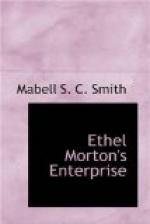“Poor old things, I believe they would like it!” exclaimed Helen.
“This is a regular underground village,” commented Mrs. Morton, as they walked for a long distance through narrow passages until they found themselves at the heading of a drift where the men were working.
“Is there any gas here?” asked the Superintendent, and when the miners said “Yes,” he lifted his hand light, which was encased in wire gauze, and thrust it upwards toward the roof and gave a grunt as it flickered near the top.
There it was, the dreaded fire-damp, in a layer above their heads. One touch of an open flame and there would be a terrible explosion, yet the miners were working undisturbed just beneath it with unprotected lamps on their caps. The visitors felt suddenly like recruits under fire—they were far from enjoying the situation but they did not want to seem alarmed. No one made any protest, but neither did any one protest when the Superintendent led the way to a section of the mine where there was no gas that they might see a sight which he assured them was without doubt wonderful.
They were glad that they had been assured that there was no fire-damp here, for their leader lifted his lamp close to the roof. Ethel Blue made the beginning of an exclamation as she saw his arm rising, but she smothered her cry for her good sense told her that this experienced man would not endanger the lives of himself or his guests. The coal had been taken out very cleanly, and above them they saw not coal but shale.
“What is shale?” inquired Helen.
“Hardened clay,” replied the Superintendent. “There were no men until long after the carboniferous period when coal was formed, but just in this spot it must have happened that the soil that had gathered above the deposits of coal was very light for some reason or other. Above the coal there was only a thin layer of soft clay. One day a hunter tramped this way and left his autograph behind.”
He held his lamp steadily upward, and there in the roof were the unmistakable prints of the soles of a man’s feet, walking.
“It surely does look mightily as if your explanation was correct,” exclaimed Mr. Emerson, as he gazed at the three prints, in line and spaced as a walker’s would be. Their guide said that there had been six, but the other three had fallen after being exposed to the air.
“I wish it hadn’t been such a muddy day,” sighed Ethel Blue. “The mud squeezed around so that his toe marks were filled right up.”
“It certainly was a muddy day,” agreed Roger, “but I’m glad it was. If he had been walking on rocks we never should have known that he had passed this way a million or so years ago.”
They were all so filled with interest that they were almost unwilling to go on in the afternoon, although Mr. Emerson promised them other sights around Uniontown, quite different from any they had seen yet.




